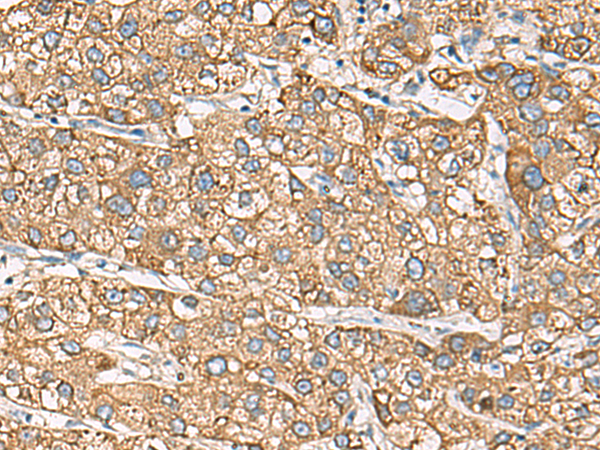
| WB | 咨询技术 | Human,Mouse,Rat |
| IF | 咨询技术 | Human,Mouse,Rat |
| IHC | 1/50-1/100 | Human,Mouse,Rat |
| ICC | 技术咨询 | Human,Mouse,Rat |
| FCM | 咨询技术 | Human,Mouse,Rat |
| Elisa | 1/5000-1/10000 | Human,Mouse,Rat |
| Aliases | CKLFSF4 |
| Host/Isotype | Rabbit IgG |
| Antibody Type | Primary antibody |
| Storage | Store at 4°C short term. Aliquot and store at -20°C long term. Avoid freeze/thaw cycles. |
| Species Reactivity | Human, Mouse |
| Immunogen | Synthetic peptide of human CMTM4 |
| Formulation | Purified antibody in PBS with 0.05% sodium azide and 50% glycerol. |
+ +
1. **"CMTM4 inhibits cell proliferation and migration via MAPK signaling in gastric cancer"**
*Authors: Zhang Y, et al. (2020)*
**摘要**: 研究利用CMTM4抗体检测其在胃癌组织中的表达,发现CMTM4通过抑制MAPK信号通路降低癌细胞增殖和转移能力,低表达与患者不良预后相关。
2. **"CMTM4 stabilizes PD-L1 to suppress antitumor immunity and promotes immunotherapy resistance"**
*Authors: Li W, et al. (2018)*
**摘要**: 该研究通过免疫共沉淀(使用CMTM4抗体)揭示CMTM4与PD-L1的相互作用机制,表明其通过稳定PD-L1蛋白促进肿瘤免疫逃逸,并与抗PD-1治疗耐药相关。
3. **"CMTM4 loss correlates with tumor microenvironment remodeling and poor prognosis in colorectal cancer"**
*Authors: Wang L, et al. (2021)*
**摘要**: 利用CMTM4抗体进行免疫组化分析,发现CMTM4在结直肠癌中低表达与肿瘤微环境中免疫抑制性细胞(如Tregs)浸润增加相关,提示其作为免疫治疗靶点的潜力。
4. **"CMTM4 is a subunit of the CCR6 complex and regulates TH17 cell differentiation"**
*Authors: Chen H, et al. (2019)*
**摘要**: 研究通过抗体介导的蛋白质互作实验,证实CMTM4是CCR6复合物的组成成分,调控IL-17分泌及TH17细胞分化,影响自身免疫性疾病进程。
The CMTM4 (CKLF-like MARVEL transmembrane domain-containing protein 4) antibody is a tool used to study the function and expression of the CMTM4 protein, a member of the chemokine-like factor (CKLF) superfamily. CMTM4 is involved in immune regulation, cell signaling, and tumorigenesis. It is broadly expressed in human tissues, including immune cells, epithelial cells, and certain cancers. Research highlights its role in stabilizing PD-L1 (programmed death-ligand 1), a key immune checkpoint protein, by preventing its lysosomal degradation. This interaction links CMTM4 to tumor immune evasion and response to anti-PD-1/PD-L1 therapies.
Antibodies targeting CMTM4 are utilized in techniques like Western blot, immunohistochemistry (IHC), and immunofluorescence (IF) to detect protein levels, localization, and interactions in cell lines or clinical samples. Studies using these antibodies have revealed reduced CMTM4 expression in some cancers, correlating with poor prognosis or therapeutic resistance. Additionally, CMTM4 antibodies help explore its regulatory mechanisms in immune pathways, such as NF-κB signaling, and its crosstalk with other oncogenic molecules. Their applications extend to preclinical models to evaluate CMTM4 as a potential biomarker or therapeutic target in cancer immunotherapy and inflammatory diseases.
×